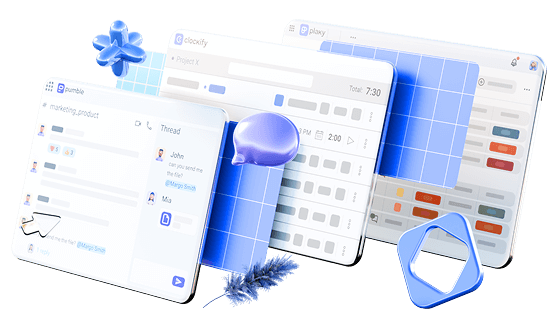Since 2017, I’ve been at the forefront of advocating for a transformation in our work paradigms. The need for change is apparent as many organizations struggle to foster efficient work environments that truly prioritize their employees. In bridging this gap, artificial intelligence (AI) presents a promising solution — offering the tools to streamline processes, empower employee-centric workflows, and catalyze a cultural shift towards more flexible work arrangements.
A recent study by Gartner shows that 79% of corporate strategists see AI as critical to their success over the next two years, signifying a transformative leap in the future of work.
This article will decode the AI revolution within distributed teams, by:
- Highlighting key takeaways,
- Exploring the operational challenges of today, and
- Presenting specific AI-driven solutions that are reshaping the landscape of distributed work.
- AI is becoming a critical component for distributed teams: As an emerging pivotal element in transforming distributed workspaces, AI is going beyond a trend to become an indispensable asset in the modern workplace.
- AI is helping improve communication and decision-making: AI solutions are aiming to enhance workplace communication and decision-making, ensuring better clarity and efficiency, which is especially crucial for distributed teams.
- AI Agents are emerging: Tools such as AI-Mentor, meant to help you master the technology, illustrate AI’s capabilities in providing personalized support, fostering skill development, or change management, which is particularly beneficial in navigating the complexities of distributed workforces.
- AI is helping boost emotional intelligence and personal growth: AI solutions are not only aiming to enhance cognitive skills but also to contribute to developing emotional intelligence, leading to more empathetic and fulfilling work environments.
- AI is also bringing new challenges: While AI offers many benefits, it also presents challenges that require careful consideration and strategic planning to ensure these tools are utilized effectively and ethically.
The operational challenges of today — and why they emerged
Before diving into the transformative impact of AI, let’s look at today’s workplace challenges.
From my own experience — after advising over 3,000 companies on how to carry out remote and hybrid work at Remote-how — these challenges are connected to the following:
- Poor communication — communication is fraught with unproductive meetings and constant interruptions.
- Inefficient collaboration — collaboration suffers from inadequate planning, goal-setting, and knowledge management.
- Misguided leadership — leaders often lack essential soft skills and tend toward micromanagement, making decisions that aren’t driven by data.
As we acknowledge these imperfections and strive for improvement, it’s clear that the change management process requires time and dedication.
But why have these operational challenges emerged in the first place?
In short — some teams had trouble adjusting to the newly imposed distributed workflow.
Since the inception of Remote-how, we’ve observed and interacted with many teams that thrived in a distributed environment well before the advent of the COVID-19 pandemic.
These teams were pioneers, setting a gold standard with their robust work culture and remarkable performance metrics. They had established “best practices” such as asynchronous communication, results-oriented workflows, and flexible scheduling that empowered employees with autonomy and accountability.
In contrast, when distributed work became the norm in 2020, many organizations found themselves navigating uncharted waters. Lacking the time and experience to adopt these proven practices, they struggled to replicate the same successes, often grappling with coordination complexities and cultural shifts.
Why AI can be important in helping with operational challenges
Enter AI — the game-changer in enhancing process efficiency and ingraining new habits — studies show AI can improve employee productivity by 66%.
As the AI market soars towards a predicted $4 trillion by 2025 (McKinsey), 65% of US business leaders view generative AI as a disruptive force in the upcoming years (KPMG).
In this environment, we’re poised to witness several game-changing trends unfold — including the potential rise in popularity for new work schedules, such as the 3-day workweek — which would transform the landscape for individual contributors, team leaders, and entire organizations.
Solutions and benefits AI offers for operational challenges
Having the above operational challenges in mind — and the points made about how AI can make a difference — I want to share 2 specific AI solutions that are game changers for the happy & efficient future of work + the benefits of AI solutions in general.
#1 Context-aware AI: bridging the gap in distributed work
Distributed teams often grapple with AI-generated outputs that lack context and fail to align with specialized roles, tasks, or industry-specific nuances, leading to miscommunications and inefficiencies.
Context Fusion — i.e. the practice of infusing LLMs (Large Language Models) with domain-specific data— addresses this gap by providing AI tools with the contextual details necessary to produce more meaningful and relevant outputs. This customization of AI processes allows for an enhanced representation of a business’s character, objectives, and the diverse contexts in which distributed teams operate.
Here are the use cases for context-aware AI:
- Project Management: For project managers overseeing distributed teams, LLMs equipped with details about project histories, client profiles, and task-specific jargon can automatically generate status reports and risk assessments. Also, LLMs can ensure more tailored communication for team members — enhancing clarity and project coherence across different time zones.
- People Operations: In HR, context-rich LLMs can streamline recruitment by analyzing resumes against company-specific role requirements and culture fit criteria. As a result, talent acquisition becomes more strategic, aligning candidate profiles with organizational values and work styles that are crucial for effective collaboration in distributed settings.
- Cross-Cultural Team Building: For teams spread across various cultural backgrounds, AI-enhanced cultural insights and language nuances can assist in creating training materials and communication guidelines that foster inclusion and understanding. This approach would nurture a healthy remote work culture, bridging gaps and promoting unity in global teams.
#2 Smart Assistants: AI empowerment in the virtual workplace
Employees across various industries find themselves mired in routine, time-consuming activities, which detracts from their engagement in more impactful and fulfilling work, ultimately affecting their overall job satisfaction and output quality.
The advent of AI Agents, such as AI Mentor — i.e. intelligent digital assistants designed to bear the burden of repetitive tasks — seems to herald a new era in the workplace. These AI Agents promise to operate with precision, autonomously performing specific duties and integrating with multiple tools — all to deliver data-driven results. This shift in task distribution can enable human workers to focus their energies on higher-level strategic initiatives and creative endeavors — thereby maximizing the potential of human-AI collaboration.
Here are the use cases for Smart Assistants:
- Automated data management for individuals: By taking charge of routine data entry tasks, AI Agents can liberate individual contributors to invest their time in strategic planning and innovative projects, fostering a culture of creativity and proactive problem-solving within distributed workforces.
- AI-driven scheduling for team leaders: AI Agents can streamline the coordination of meetings and work sessions, optimizing schedules to enhance productivity. This should ensure that team leaders can concentrate on nurturing team dynamics and driving mission-critical initiatives, even when managing remote teams.
- Enhanced customer interaction for organizations: Leveraging AI for customer service functions can transform responsiveness, enabling prompt and effective resolutions to customer inquiries. This boost to service quality can in turn enhance customer loyalty and solidify brand reputation, a crucial advantage for organizations in a competitive market.
#3 AI in general: The catalyst for enhanced smart and emotionally intelligent workplaces
AI can revolutionize the way we interact, learn, and understand each other in the workplace.
By streamlining communication, fostering cultural understanding, and personalizing learning experiences, AI can enhance both our cognitive and emotional intelligence.
AI writing assistants and meeting summarizers can streamline and clarify interactions, ensuring focus and coherence.
Real-time translation services and cultural insights provided by AI can enhance global comprehension and empathy, encouraging a more inclusive and harmonious work environment.
Furthermore, personalized AI-driven development pathways can ensure that employees’ skills evolve in line with market trends.
Here are the use cases for AI in general:
- Adaptive learning & communication enhancement for individuals: AI can shape personalized growth journeys, leveraging tailored learning modules and smart communication tools that enhance both professional know-how and emotional intelligence, nurturing a more interconnected and insightful individual contributor.
- Strategic team development & harmony for leaders: AI can equip team leaders with sophisticated conflict resolution tools and insights into team competencies. By doing so, it should help foster a harmonious culture that thrives on collaboration — while reinforcing the collective skill set required to excel in a competitive landscape.
- Cultural intelligence & skill forecasting for organizations: With AI’s analytical prowess, organizations can gain a deep understanding of cultural dynamics and the foresight to anticipate necessary skill developments. This can in turn enable them to establish training agendas that align with the principles of diversity, innovation, and empathetic leadership within a global team framework.
The challenges AI poses to knowledge workers
The integration of AI into our daily work lives can be instrumental — but it’s not the universal solution for everything some may hope it is. For knowledge workers, there are unique challenges that need to be navigated:
- Information Overload: AI systems can provide more information than ever before, potentially overwhelming workers with data rather than aiding in decision-making.
- Skill Displacement: As AI tools become more proficient, there is a growing need for workers to adapt their skill sets to remain relevant in an AI-driven environment.
- Loss of Interpersonal Skills: The efficiency of AI can inadvertently lead to a decline in human interaction, which may erode interpersonal skills essential for team dynamics.
- AI Decision Auditability: As AI assumes larger roles in operations and decision-making, ensuring that such decisions are transparent and auditable becomes a challenge.
- Adaptation to AI Teammates: The need to collaborate with AI agents as team members requires an adjustment in work patterns and trust in automated systems.
These challenges highlight the need for a measured approach to AI integration — one that fosters advancement while mitigating potential downsides.
Conclusions
As we look towards the horizon of professional landscapes, artificial intelligence stands out as a transformative force — one that may not be the answer to every problem, but will still likely play a large role in shaping the future of work:
- As a helpful tool for distributed teams
- As an enhancement for workplace communication and decision-making
- As a contribution to emotional intelligence and personal growth




